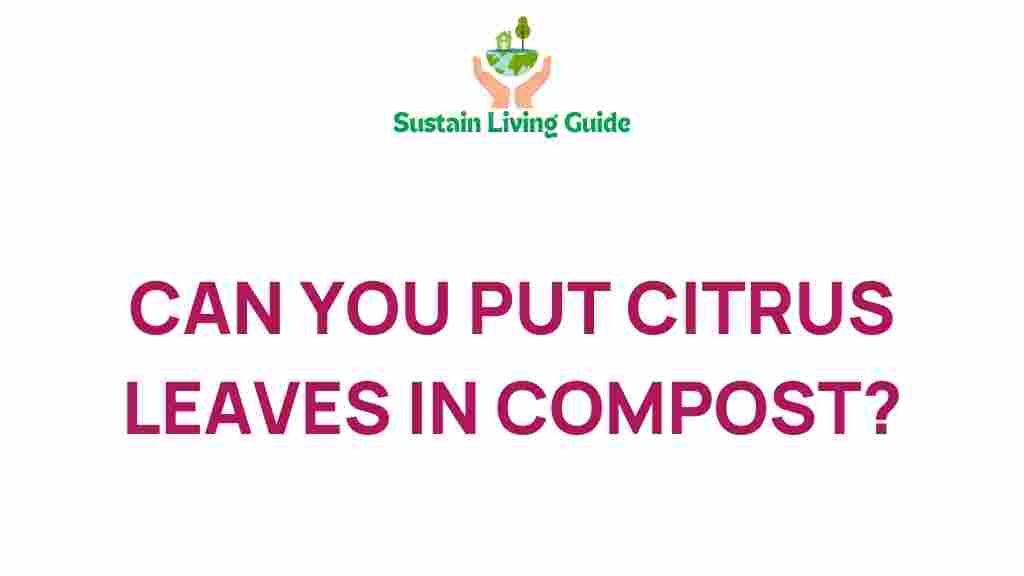The Surprising Truth About Citrus Leaves in Your Compost
When it comes to composting, there are many dos and don’ts that gardeners and eco-enthusiasts often discuss. Among the many materials that you may consider adding to your compost pile, citrus leaves often raise eyebrows. Some swear by their benefits, while others warn against their use. What’s the real story? In this article, we will explore the surprising truth about citrus leaves in your compost, providing you with insights that can help you make informed decisions for your composting endeavors.
Understanding Compost and Its Benefits
Compost is an organic material that has decomposed and can be used as a fertilizer in gardening and landscaping. It is rich in nutrients and helps improve soil structure, promotes plant growth, and increases soil’s ability to retain moisture. Here are some benefits of compost:
- Nutrient-rich: Compost provides essential nutrients to plants.
- Improves soil structure: It enhances aeration and water retention.
- Reduces waste: Composting helps divert waste from landfills.
- Environmentally friendly: It reduces the need for chemical fertilizers.
Can You Compost Citrus Leaves?
The question of whether to compost citrus leaves can be contentious. Some gardeners believe that citrus leaves can add valuable nutrients, while others caution against their use due to their potential acidity and high oil content. Let’s break down the facts.
The Benefits of Citrus Leaves in Compost
Citrus leaves, like those from oranges, lemons, and limes, offer several benefits for composting:
- Nutrient content: Citrus leaves contain nitrogen, phosphorus, and potassium, essential nutrients for healthy plant growth.
- Natural pest repellents: The oils in citrus leaves can deter certain pests.
- Carbon-to-nitrogen ratio: They can help balance the carbon-to-nitrogen ratio in your compost pile.
Potential Concerns with Citrus Leaves
While there are some benefits to adding citrus leaves to your compost, there are also valid concerns:
- Acidity: Citrus leaves can make the compost more acidic, which may not be suitable for all plants.
- High oil content: The oils in citrus leaves can slow down the decomposition process.
- Insect attraction: The strong scent of citrus may attract unwanted insects.
How to Compost Citrus Leaves Effectively
If you decide to incorporate citrus leaves into your compost, follow these steps for effective composting:
- Chop the Leaves: Cut the citrus leaves into smaller pieces. This increases the surface area and helps speed up decomposition.
- Mix with Brown Materials: Balance the citrus leaves with brown materials such as dried leaves, straw, or cardboard. This will help manage the acidity and oil content.
- Maintain Aeration: Turn your compost pile regularly to ensure adequate aeration, which will help break down the citrus leaves more efficiently.
- Monitor Moisture Levels: Keep the compost pile moist but not overly wet. Citrus leaves can retain moisture, so adjust accordingly.
- Use in Moderation: Limit the amount of citrus leaves to about 10-15% of your total compost volume to avoid potential issues.
Common Troubleshooting Tips for Composting Citrus Leaves
If you encounter issues while composting citrus leaves, consider the following troubleshooting tips:
- Too Acidic: If your compost is too acidic, add more alkaline materials like wood ash or crushed eggshells.
- Slow Decomposition: If the citrus leaves seem to be decomposing slowly, ensure you’re turning the pile regularly and maintaining proper moisture levels.
- Odor Issues: A strong smell can indicate that your compost is too wet or lacks aeration. Turn the pile and add dry materials to balance it out.
- Insect Problems: If you notice an influx of insects, consider covering the compost pile or using a compost bin with a lid.
Alternative Uses for Citrus Leaves
If you prefer not to compost citrus leaves, there are alternative ways to utilize them:
- Mulch: Use chopped citrus leaves as mulch around your plants to help retain moisture and suppress weeds.
- Tea: Make a nutrient-rich tea by steeping citrus leaves in water. This can be used to water your plants.
- Repellent: Use citrus leaves to create a natural insect repellent by infusing them in oil.
Conclusion: The Final Word on Citrus Leaves in Compost
Citrus leaves can be a valuable addition to your compost pile, but they should be used thoughtfully and in moderation. Their nutrient content and natural pest-repelling properties can enhance your compost, but their acidity and oil content may pose challenges. By following the guidelines outlined above, you can successfully incorporate citrus leaves into your compost and reap the benefits they offer.
For more information on composting, check out this detailed guide. And if you’re looking for additional tips on gardening and sustainable practices, don’t hesitate to explore more articles on our website.
In summary, embrace the surprising truth about citrus leaves in your compost and make the most of them while being mindful of their properties. Happy composting!
This article is in the category Eco-friendly and created by SustainLivingGuide Team
